The retail brand and women’s artisan marketplace champions artisans from more than 40 countries
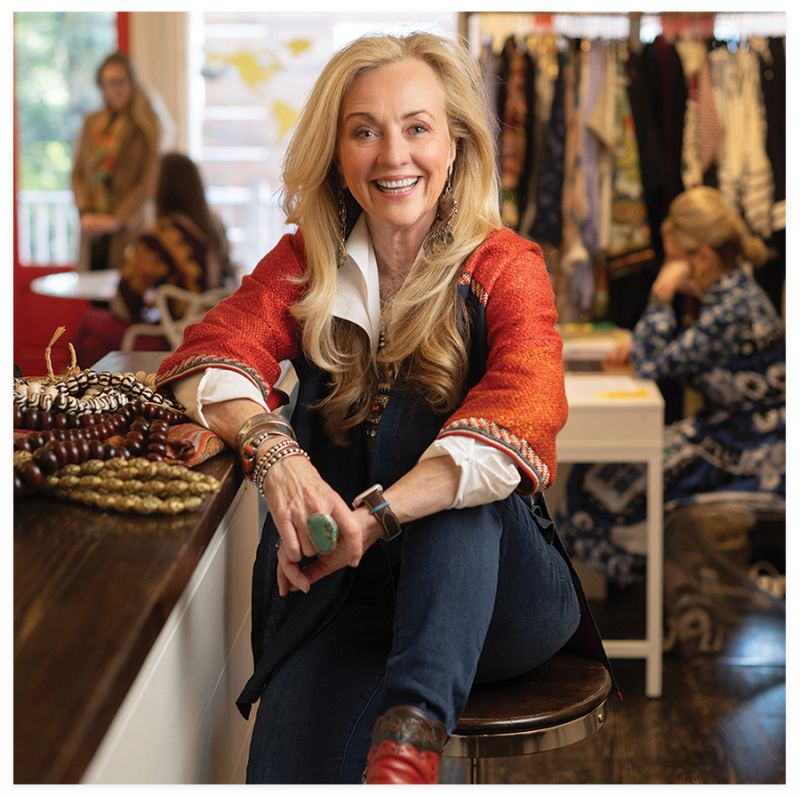
“Haiti is spiraling” read the e-mail subject line. At a moment of dire concern in the wake of an earthquake and escalating gang anarchy in her homeland, Dayanne Danier dashed off a note of desperation to someone who she knew had her back—Susan Hull Walker and her team at Charleston-based Ibu Movement. It was September 2022, and Danier’s beloved Haiti, where she oversees Bien Abyé, a group of women artisans highly skilled in beadwork and embroidery, was in full lockdown, paralyzed by roadblocks in major cities, a government in shambles, soaring fuel prices, and out of control kidnappings. Her team’s workspace had been damaged, but the 65 women of Bien Abyé were determined to continue creating intricate handbags, home decor, and other accessories that not only gave them income but, more significantly, hope. “Things are bleak. This is a Haiti on the verge of complete collapse, but we are pushing forward,” she wrote. “Keep us in your thoughts and thank you for always being a great partner.”
Bien Abyé is but one of some 100 artisan groups from 40 different countries championed by Ibu Movement. Many, like Haiti, are regions beset by conflict and poverty. Walker opened the doors of Ibu (ē-boo) in 2013 as a retail brand and women’s artisan marketplace, which today commands a growing global reach from its second-floor perch on lower King Street, where Walker’s team did more than keep Danier and the women of Bien Abyé in their thoughts. Ibu gave them work, placing orders for more products like the signature Bien Abyé clutch beaded with the unmistakable visage of style icon Iris Apfel, an early Ibu ambassador. What’s more, Ibu Foundation provided a grant to help repair and improve their workshop. “I’m so grateful. That Iris clutch put us on the map,” says Danier, whose products can now also be found at Nordstrom and other high-end stores.
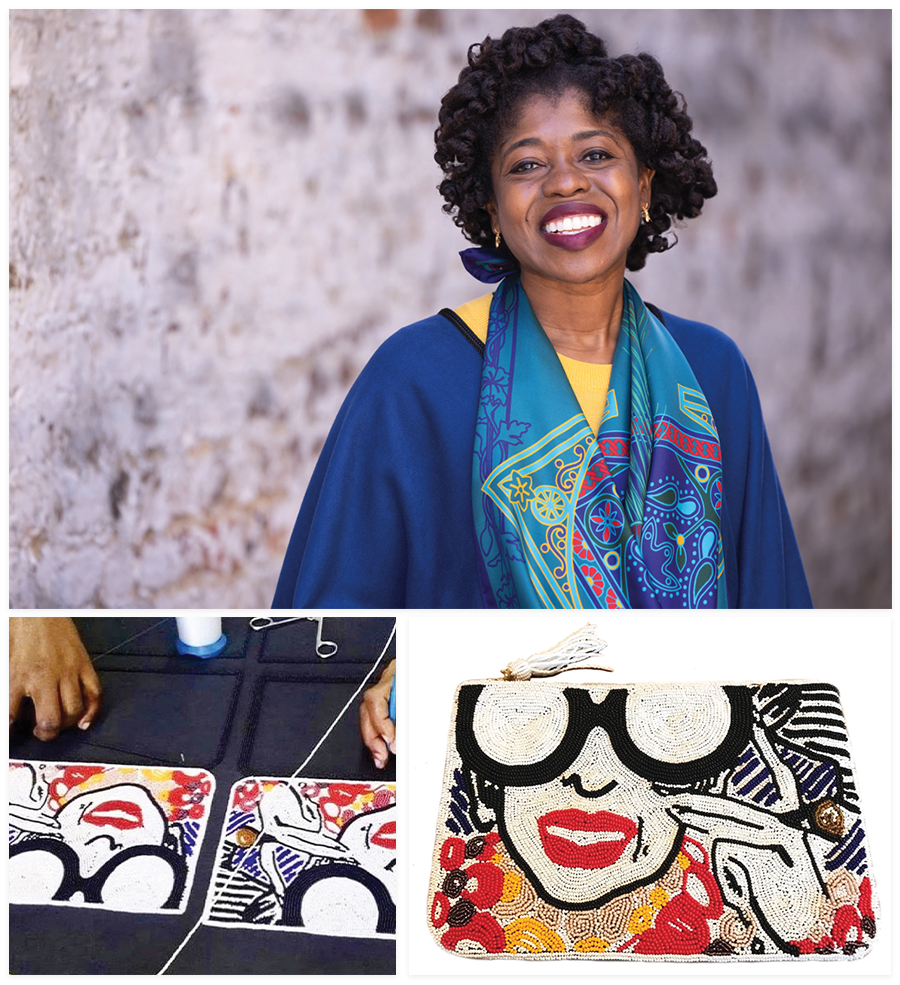
The signature Iris Apfel beaded clutch, handmade by the women of Bien Abyé in Haiti for Ibu; “I’m so grateful. That Iris clutch put us on the map,” says Bien Abyé founder Dayanne Danier (top), whose pieces can now also be found at other high-end stores.
Alongside Bien Abyé’s goods, the Ibu marketplace sells elegant Moroccan jackets and caftans made by women in Sefrou and Ourika; vibrant, silk ikat dresses hand-dyed by Muhayo Alieva’s collective in Uzbekistan; felted wool dresses and jackets from seven sisters in Kyrgyzstan; among numerous other clothes, accessories, and home decor. Though just a short stroll from the fast fashion at H&M, Ibu offers the antithesis: a dazzling United Nations of heritage handiwork, much of it a collaborative design process with the artisans led by Ibu studio’s lead designer Marisa Nemirow. Luminous hues—magenta, vermillion, chartreuse, and naturally dyed indigo—catch the eye, while intricate weaving and embroidery and handcrafted jewelry all speak to timeless yet endangered skills and techniques, laden with cultural meaning.
For centuries in remote corners across every continent, mothers have taught daughters—just as their mothers taught them—the skills for expressing their tribal or cultural stories in textiles and jewelry, but that storytelling, that craftswomanship, is at risk. Undervalued in a modern marketplace driven by all things cheaper, faster, and trending on TikTok, the traditional, time-consuming, and typically women’s work of say, looming a Himroo jacket in India or creating knotted buttons in Morocco, is fading, succumbing to industrial pressure.
The Ibu Movement, as envisioned by Walker, seeks to change this. “When women’s skills are valued, when women gain economic power and sovereignty through the work of their hands, lives change,” Walker says. Women gain respect, children get educated, communities are enhanced, even in places like Afghanistan, where the Ibu Foundation through a State Department grant is investing $400,000 to assist in the marketing and distribution of the artisans’ goods in the US. In addition, a training program for girls is underway. “Under the Taliban rule, girls 12 to 15 are forbidden to go to school, but we are setting up a program to teach them traditional textile skills, business skills, and personal skills,” Walker adds. “They see that craft has value and art can be a revolutionary, subversive form of expression. These young girls begin to imagine a larger world, one in which they and their work are valued.”
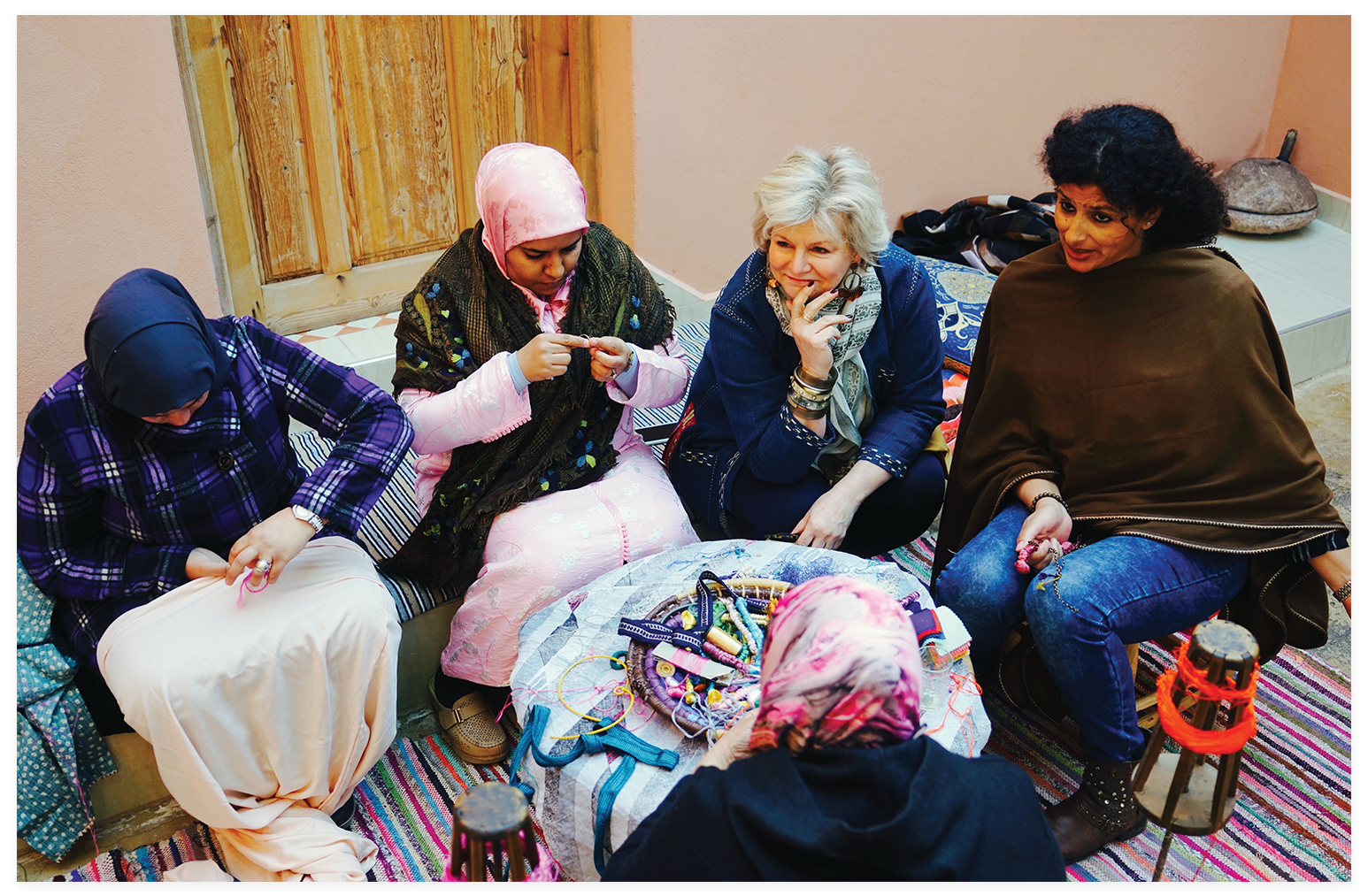
Mas Moss: Noted designer and Ibu Ambassador Charlotte Moss (second from right) with artisan leader Nawal El Hariti (right) in Ourika, Morocco, planning for the Charlotte Moss X Ibu collection released in fall 2017. Moss returns to Charleston this March to debut her second Ibu collection.
Women of Respect
Susan Hull Walker, a Kentucky native with a master of divinity from Harvard Divinity School and a background in world religions, came to Charleston as a United Church of Christ minister in the early 1990s. She was an ordained woman of the cloth, literally, but today Ibu is her pulpit, so to speak, and textiles the “text” that ignites her passion. Through her long-standing interest in textiles and extensive travels to learn fiber art traditions around the world, Walker has a deep knowledge and appreciation for how women’s stories are embedded, interwoven, seamed, stitched, and embroidered in cloth, through practices and techniques sacred in many cultures. From her father, a revered theologian, and her mother, an expert seamstress and lover of design, she inherited the DNA strands she now weaves together in her own ebullient, border-crossing fashion. Walker, an evangelist for the transformative power of beauty as crafted by women, has found her life’s work.
“When I met women artisans in Indonesia who referred to their mothers and mentors as ‘ibu,’ which translates to ‘women of respect,’ I knew this was my calling,” she explains. “Ibu has never been just about selling beautiful clothes. For me, it’s always been a movement driven by a motivation to put money in the hands of women, because I saw how that changes lives,” Walker says. Ibu may be a global enterprise, but it’s also “about the worlds within us,” both for the artisans, who—because their work is celebrated and valued—begin to see themselves as empowered, respected leaders, and for customers, who begin to understand their buying power can have profound impacts. “We meet women at trunk shows and in the store who say, ‘Wow, these clothes are so beautiful, but you have to be bold to wear them.’ Which is exactly the point—we want to bring out the bold in every woman.”
For Nemirow, working with these skilled artisans to create the custom Ibu collection for the sophisticated Western market has been a rewarding challenge. As the former retail manager for Hampden Clothing on King Street, Nemirow is well-versed in high-end design and the whims of boutique fashion. “Marisa has done almost every job at Ibu, from sales manager to now being lead designer. She comes from a fashion background and brings her own highly cultivated sense of style. She can read a look in an instant and is gifted at intuiting how a style will fit on real bodies,” says Walker.
Even so, adapting heritage crafts into modern styles can be difficult, Nemirow notes, particularly when language barriers and international shipping delays complicate the sending of patterns and samples back and forth. “But when the final design comes to fruition just as we envisioned, it all pays off,” says Nemirow, who has been with Ibu since the doors opened 10 years ago and has custom-designed patterns ranging from an Ibu signature Moroccan jacket to A-line tunics to full skirts with peplum hems. “And the list goes on from there,” she adds. “I love it when the artisans see their final creations styled for our photo shoots and they are just beaming with pride and joy.”
Nemirow and Walker also collaborate with notable style and design leaders and brands, including Ali MacGraw, Iris Apfel, Charlotte Moss, Mercedes Salazar, and Schumacher, each of whom has created a signature collection for Ibu. “We are fortunate to have amazing Ibu allies who share our passion for preserving these cultural languages and elevating artisan-crafted textiles,” says Walker. Moss, famed for her interior design and impeccable eye, will launch her second Ibu line—this one from Morocco—at Ibu’s International Women’s Day event on March 6. “A Night in Medina” will feature Moss and Ibu global artisan champion Nawal El Hariti from Morocco, where she and her team handmade each Moss-designed piece, working through and in spite of recent earthquake devastation. “Heritage crafts are essential in telling the stories of people around the world—this we cannot lose,” says Moss. “Ibu’s global partnerships give women a vital role in preserving these crafts, and in turn, they’re contributing to their local economy, educating other women to carry these skills forward, and establishing self-authorized lives. It’s incredibly meaningful and exciting.”
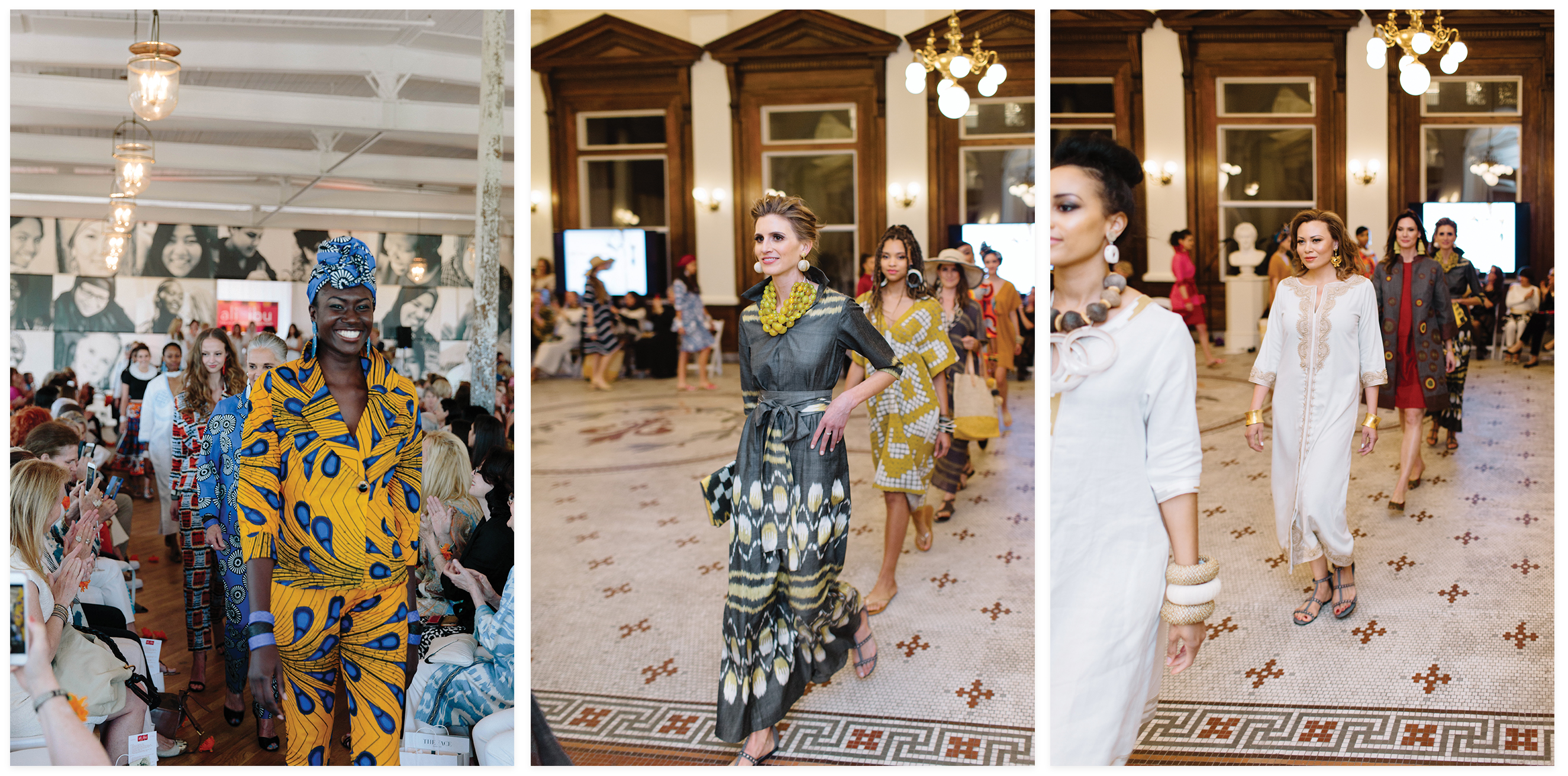
Ibu on the Runway: (Left to right) The April 2017 Ali4Ibu fashion show at The Cedar Room, with Shavonne Mack modeling Ali MacGraw designs; the Ibu Foundation’s March 2019 launch and World Dress Collection show at the Gibbes Museum of Art, with opera singer and Ibu ally Alyson Cambridge; and Chelsea Rampersant and Eddie Irions on the runway at The Fringe Revolution fundraiser at Festival Hall last spring.
Doubling Reach & Impact
Moss was a featured guest at a Gibbes Museum fashion show in 2019 when Walker launched the Ibu Foundation, a 501(c)(3) arm that goes beyond expanding artisan marketplace opportunities to building capacity for artisans. The foundation directly funds training sessions, supplies, and workspace improvements (like those at Bien Abyé), as well as, during the pandemic, providing direct emergency relief for artisans and their families. It is designed to support artisans broadly, whether or not they are Ibu retail partners. To date, it has raised more than $2.7 million, which has funded projects ranging from building a workspace and elementary school (designed by noted Colombian architect Juliana Ramirez) for Wayuu artisans in the remote Guajira Peninsula of northern Colombia, to funding website development and retail space for SheWorks, a Pakistani cooperative famed for exquisite embroidery. “As sales have increased, I’ve seen the women become more professional and dedicated, and the quality of their work has improved beyond expectations,” says Samina Mahmud, SheWorks founder and longtime Ibu partner.
The success and expanding reach of the Ibu Foundation has caught the attention of others in the global artisan community, including the Aspen Institute’s Artisan Alliance, which has chosen to transfer all of its deep resources and artisan network to Ibu Movement to further their work under the Ibu umbrella. According to Walker, establishing the nonprofit foundation was the “flame that let Ibu really take off,” expanding far beyond her personal passion project. “We’re now moving to the level where being an Ibu is embraced by women all over the world—a vital, energized, electric movement where artisanship is just the beginning,” she says. As part of Ibu’s 10th anniversary celebration in 2023, the nonprofit launched a 10-year initiative and $2-million capital campaign to double its charitable impact, with the goal of enhancing the livelihood of some 200,000 women artisans across the world.
If artisanship is the beginning, then strengthening bonds with and between the artisans is the next step, already well underway.
Through Ibu’s new Fringe Road Travel adventures, interested enthusiasts can visit Kenya, Morocco, Uzbekistan, and Colombia, with plans in the works for Rwanda and South Africa, to experience firsthand the world and craft of Ibu’s partners. And through bringing artisans to Charleston for networking and design sessions, Ibu is helping establish deeper bonds and alliances. “We realize how connected we are to one another,” says Walker. “Ibu is not just about wearing a jacket or piece of jewelry, but belonging to an exciting movement of women changing the world, one village at a time. In the exchange, the world of both artisans and allies becomes so much larger.”
For International Women’s Day in 2023, Ibu hosted “The Fringe Revolution: Women on the Edge of Change,” a global fete that, thanks to event design by Mimi van Wick, transformed Festival Hall into a Milan-worthy runway and brought six artisan champions from Pakistan, Colombia, Haiti, Morocco, Afghanistan, and Nigeria to Charleston. More recently for Ibu’s “Colombiana!” fundraiser last November, 10 Colombian “luminaries” were special guests at private dinners and a Charleston Library Society panel discussion on the state of artisan craft. These opportunities to give artisans informal time together, to share best practices, and learn from each other has proven to be incredibly and surprisingly valuable, according to Walker.
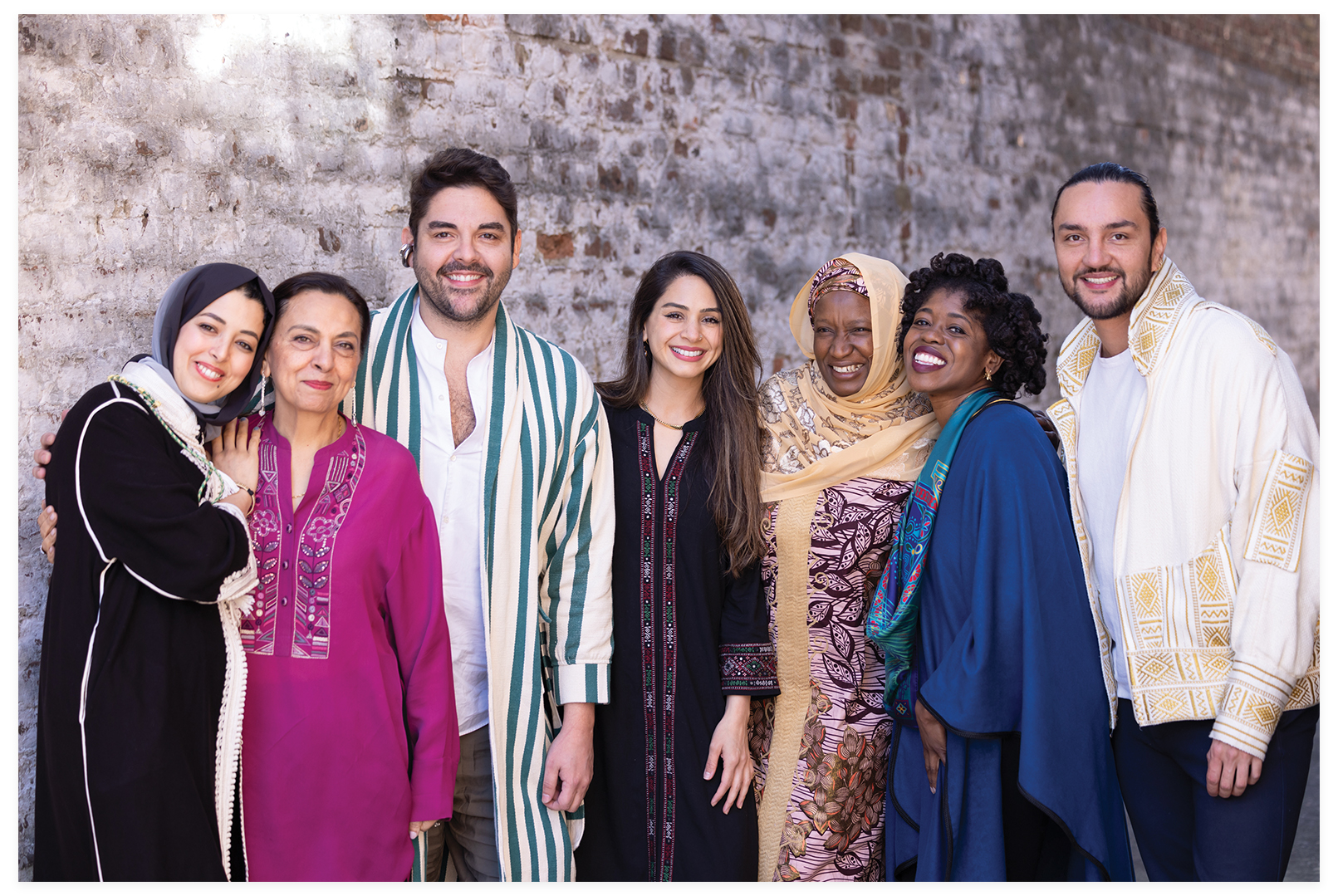
Bringing artisans together to network, share best practices, and brainstorm solutions to common challenges “has been more valuable for them and for us than we realized,” says Walker. Ibu Global Champions (from left) Wafae Safar (Cherry Buttons, Morocco), Samina Mahmud (SheWorks, Pakistan), Juan Pablo Gomez (El Dorado Edit, Colombia), Gulmina Mahmud (SheWorks, Pakistan), Hassana Yusuf (Queen Amina Embroidery, Nigeria), Dayanne Danier (Bien Abyé, Haiti), and Juan Sebastian Rivera (El Dorado Edit, Colombia) in Charleston on International Women’s Day, March 8, 2023.
True Couture
“Ibu is becoming a hub where artisans know they have a voice. When they come to Charleston, we get to hear about their lives and dreams, and they get to know and bond with other artisan leaders. It’s life-changing,” she says. When Pakistani artisan leader Samina Mahmud came to Charleston and joined the Ibu team for a design session, she shared that her biggest struggle was her own sense of confidence and authority. “We talked about that, explored it, and really leaned into it,” says Walker. “Though Samina had been a designer for 15 years, it was through her collaboration with Ibu and being recognized as a ‘Global Champion’ in our eyes that she began to see herself as a leader.” Through convening artisans in Charleston, Walker delights in seeing sparks for new ideas fly around the Ibu design table. “It’s so invigorating for us all,” she says.
That was certainly the case for Danier, who has been to Charleston twice now for Ibu events. Featured at the Fringe Revolution, Danier met other artisans who have become valued colleagues and friends. “Two years later, the six of us are still on a WhatsApp chat group,” she says. “We’re still in touch, still in love with each other, still supporting each other. When Samina [of Pakistan’s SheWorks] told us she was opening a new store, we all cheered her on,” says Danier, who, despite ongoing struggles in Haiti, has had much to celebrate as well, including being the first IN THE BLK mentorship recipient supported by the famed Parisian couture house, Balmain. “What I’ve come to realize through my Balmain experience is how rare it is that artisan products by women are valued and how profound it is for Ibu to be celebrating that,” says Danier. “Ibu is the collective story of women’s lives from some of the most challenging places on Earth. When many corporations try their best to avoid conflict-laden places like Haiti, Ibu is the opposite. Ibu is there even more. Ibu is authentic. That to me is true couture.”
Ibu grew out of Walker’s global travels as she studied indigenous textile traditions. “We’re building a beautiful reciprocity with these remarkable women, who, despite enormous challenges, are rising into economic self-sufficiency,” she says.
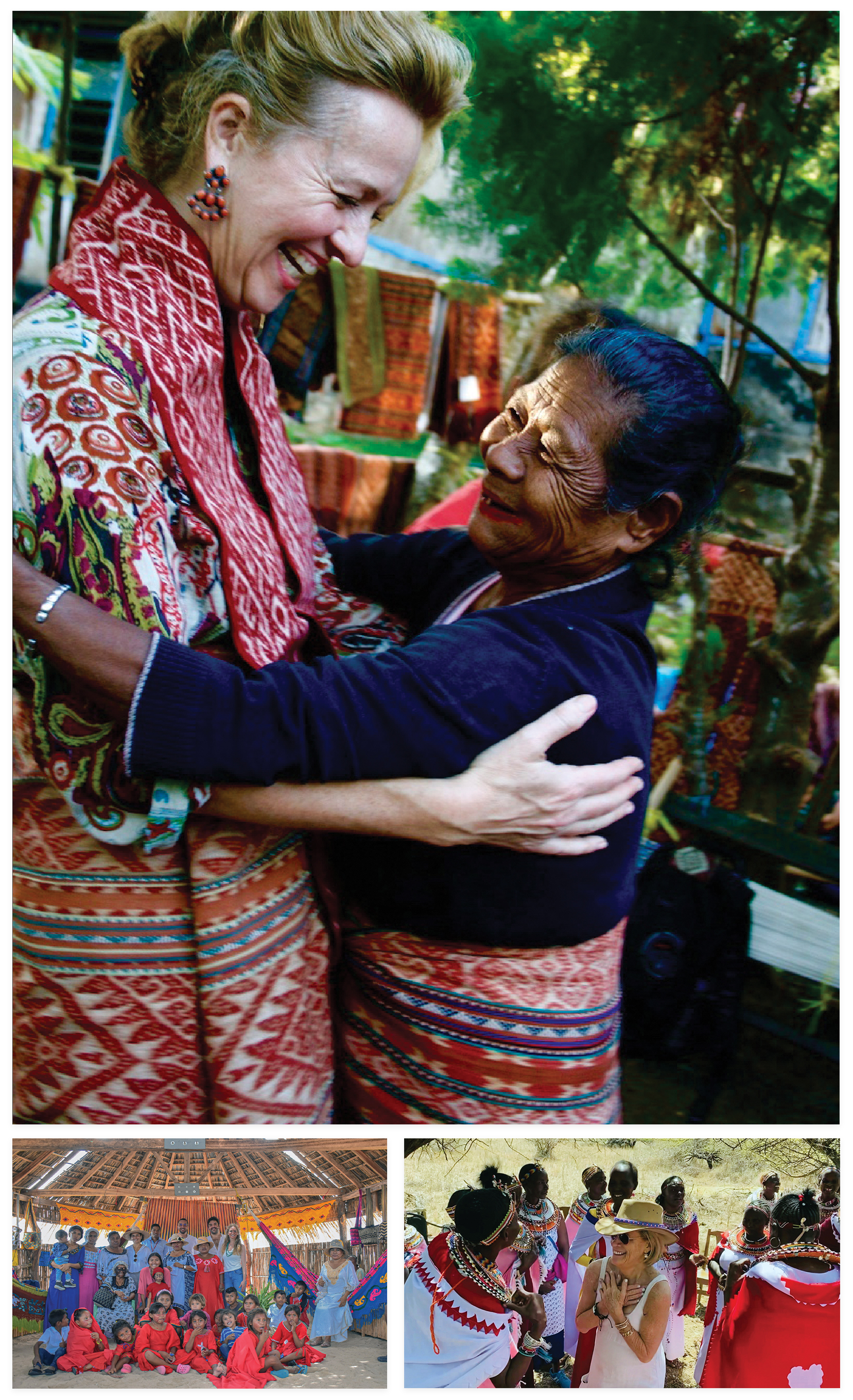
(Clockwise from top) Walker with a weaver in West Timor, Indonesia, in August 2010; Ibu supporter Heidi Walker with Samburu women on a Fringe Road adventure to Kenya in May 2022; Sain Kai, the Arema Weaving Space and Primary School in Colombia, was funded by the Ibu Foundation in 2021 and built with traditional materials and construction techniques of the Wayuu community in La Guajira.
Ibu’s special events, including annual celebrations of International Women’s Day, offer opportunities for customers, allies, and anyone interested to engage with artisans directly.
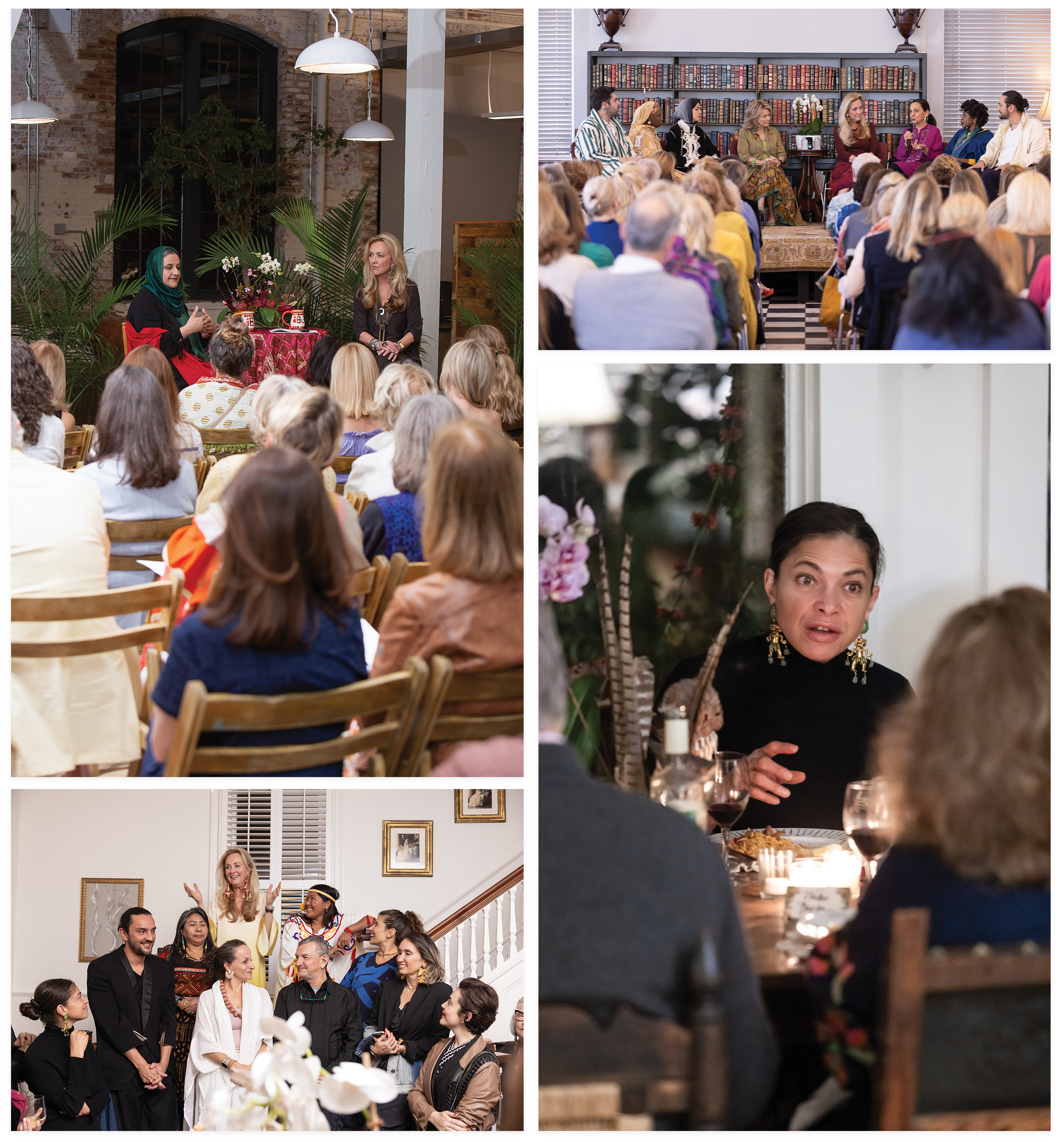
(Clockwise from top left) Rangina Hamidi, founder of Kandahar Treasure and former Minister of Education for Afghanistan, speaking with Susan Hull Walker at Ibu’s Global Champions event in March 2022; Ibu Global Champions at a panel discussion at the Charleston Library Society for International Women’s Day last year; Colombian designer Mercedes Salazar at Ibu’s fall 2023 fundraiser, Colombiana; Walker with the visiting Colombian luminaries at the home of board member Amanda Flynn.
A Night in the Medina - March 6
Ibu’s 2024 International Women’s Day fashion show and fundraiser, chaired by Rebecca Darwin, features renowned designer Charlotte Moss’s clothing and accessories line handcrafted by Nawal El Hariti and her team from Morocco. The Cedar Room, 701 E. Bay St. Wednesday, 6:30-9:30 p.m. $300 VIP, $150. ibumovement.com
WATCH: We Are Ibu
WATCH: Ibu Movement, The Fringe Revolution: Watch how fashion is lifting women out of poverty